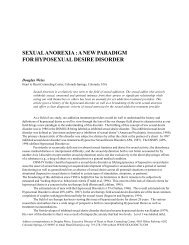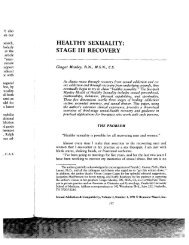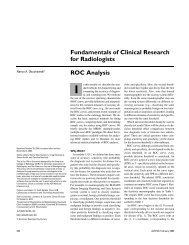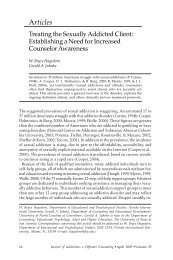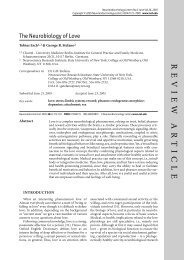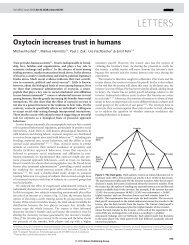An Overview of Psychiatric Ethics
An Overview of Psychiatric Ethics
An Overview of Psychiatric Ethics
Create successful ePaper yourself
Turn your PDF publications into a flip-book with our unique Google optimized e-Paper software.
project and there must always be a reasonable relationship between calculated risks orinconveniences and the benefit <strong>of</strong> the study. In clinical research every subject must retain andexert all his rights as a patient. For children and other patients who cannot themselves giveinformed consent, this should be obtained from the legal next-<strong>of</strong> kin. Every patient or researchsubject is free to withdraw for any reason at any time from any voluntary treatment and from anyteaching or research program in which he or she participates. This withdrawal, as well as anyrefusal to enter a program, must never influence the psychiatrist’s efforts to help the patient orsubject.10. The psychiatrist should stop all therapeutic, teaching or research programs that may evolvecontrary to the principles <strong>of</strong> this Declaration.Appendix 2 – The Declaration <strong>of</strong> Madrid (1996)In 1977, the World <strong>Psychiatric</strong> Association approved the Declaration <strong>of</strong> Hawaii which set outethical guidelines for the practice <strong>of</strong> psychiatry. The Declaration was updated in Vienna in 1983. Toreflect the impact <strong>of</strong> changing social attitudes and new medical developments on the psychiatricpr<strong>of</strong>ession, the World <strong>Psychiatric</strong> Association has once again undertaken a review <strong>of</strong> ethicalstandards that should be abided to by all its members and all persons practicing psychiatry.Medicine is both a healing art and a science. The dynamics <strong>of</strong> this combination are best reflectedin psychiatry, the branch <strong>of</strong> medicine that specializes in the care and protection <strong>of</strong> those who areill or infirm, because <strong>of</strong> a mental disorder or impairment. Although there may be cultural, socialand national differences, the need for ethical conduct and continual review <strong>of</strong> ethical standards isuniversal.As practitioners <strong>of</strong> medicine, psychiatrists must be aware <strong>of</strong> the ethical implications <strong>of</strong> being aphysician, and <strong>of</strong> the specific ethical demands <strong>of</strong> the specialty <strong>of</strong> psychiatry. As members <strong>of</strong> society,psychiatrists must advocate for fair and equal treatment <strong>of</strong> the mentally ill, for social justice andequity for all.Ethical practice is based on the psychiatrist’s individual sense <strong>of</strong> responsibility to the patient andjudgment in determining what is correct and appropriate conduct. External standards and influencessuch as pr<strong>of</strong>essional codes <strong>of</strong> conduct, the study <strong>of</strong> ethics, or the rule <strong>of</strong> law by themselves will notguarantee the ethical practice <strong>of</strong> medicine.Psychiatrists should keep in mind at all times the boundaries <strong>of</strong> the psychiatrist-patient relationship,and be guided primarily by the respect for patients and concern for their welfare and integrity.It is in this spirit that the World <strong>Psychiatric</strong> Association approved at the General Assembly on August25th, 1996, amended on August 8th 1999 and on August 26th 2002 the following ethical standardsthat should govern the practice <strong>of</strong> psychiatrists universally.1. Psychiatry is a medical discipline concerned with the prevention <strong>of</strong> mental disorders in thepopulation, the provision <strong>of</strong> the best possible treatment for mental disorders, the rehabilitation <strong>of</strong>individuals suffering from mental illness and the promotion <strong>of</strong> mental health. Psychiatrists servepatients by providing the best therapy available consistent with accepted scientific knowledgeand ethical principles. Psychiatrists should devise therapeutic interventions that are leastrestrictive to the freedom <strong>of</strong> the patient and seek advice in areas <strong>of</strong> their work about which theydo not have primary expertise. While doing so, psychiatrists should be aware <strong>of</strong> and concernedwith the equitable allocation <strong>of</strong> health resources.2. It is the duty <strong>of</strong> psychiatrists to keep abreast <strong>of</strong> scientific developments <strong>of</strong> the specialty and toconvey updated knowledge to others. Psychiatrists trained in research should seek to advancethe scientific frontiers <strong>of</strong> psychiatry.3. The patient should be accepted as a partner by right in the therapeutic process. Thepsychiatrist-patient relationship must be based on mutual trust and respect to allow the patientto make free and informed decisions. It is the duty <strong>of</strong> psychiatrists to provide the patient with allrelevant information so as to empower the patient to come to a rational decision according topersonal values and preferences.57IMET AN OVERVIEW OF PSYCHIATRIC ETHICS



